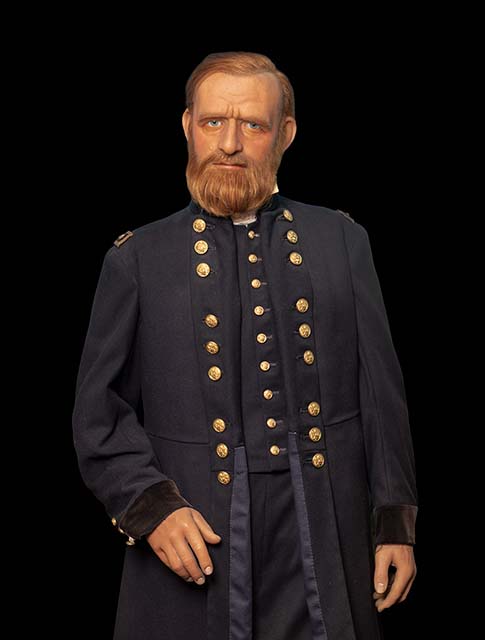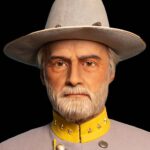Complete History of Ulysses S. Grant
Ulysses S. Grant’s history is a patriotic journey of a soldier who later went on to hold office as the 18th president of the United States. Before his administration, Grant served the United States in the Army and became widely recognized as one of the most successful military commanders in U.S. history. His most notable military achievement was leading Union forces to victory over the Confederacy during the American Civil War.
Grant grew up in a modest family and worked on his father’s farm. In 1839, he attended the United States Military Academy at West Point and was appointed second lieutenant in the U.S. Army after his graduation. Grant’s first major battle was during the Mexican-American War, in which he proved himself successful and earned a promotion to first lieutenant. When Grant resigned from the military after the Mexican-American War, he struggled to find success in civilian life and worked in a variety of jobs before his return to the military at the outbreak of the Civil War.
DID YOU KNOW?
Grant's first major battle was during the Mexican-American War.
Grant quickly gained recognition for his leadership and strategic thinking on the battlefield and rose through the ranks and was promoted to colonel. In the Civil War, he played a crucial role in several pivotal battles, including the siege of Vicksburg and the Battle of Chattanooga, and his military victories helped turn the tide of the war in favor of the Union.
Post-Civil War, Grant was recognized as a national hero and was appointed Secretary of War under President Johnson’s administration. In 1868, he was nominated as the Republican candidate for president and went on to win the election, becoming the youngest person ever elected to the presidency at the time.
Ulysses S. Grant was president of the United States from 1869 to 1877. Throughout his administration, President Grant worked to promote civil rights and economic growth. Despite the challenges he faced in office, Grant’s presidency had a lasting impact on American history, and today, he is remembered as one of the most influential figures in U.S. history.
Interesting Facts About Ulysses S. Grant
Grant’s real name is Hiram Ulysses Grant. Due to a clerical error in his acceptance to West Point, Grant held the name, Ulysses S. Grant, with the S having no meaning.
Grant’s life as a civilian resulted in alcoholism and struggles with maintaining his business ventures.
Prior to his presidency, Grant had no political background.
Grant and Lee both enlisted in the army to serve in the Mexican-American War.
During his time at West Point, Grant showed no interest in academics and proved to be a mediocre cadet.
Toward the conclusion of the Civil War, Grant and Lee had two encounters.
Shortly after President Andrew Johnson took office, Grant found that he did not care for the president.
At the age of 46, Ulysses S. Grant was the youngest president to be elected into office at that time.
During his presidency, Grant sought to annex the Dominican Republic as a U.S. territory.
Grant’s administration was filled with absurdity.
Grant was a talented author.
Grant disliked donning military attire.
On the night of President Lincoln’s assassination, Grant was expected to be a guest at Ford’s Theatre.
After the Civil War, Robert E. Lee was to be prosecuted for treason before Grant interfered.
During the Reconstruction era in 1872, Grant disassembled the KKK.
Early Life of
Ulysses S. Grant
On April 27, 1822, Ulysses S. Grant, given name Hiram Ulysses Grant, was born in Point Pleasant, OH. Ulysses was the eldest of six children to Jesse Root Grant and Hanna Simpson Grant. Grant’s father, Jesse, made his living as a tanner providing a moderate wage for the family. Ulysses S. Grant’s history documents him as a notable American figure for serving as the 18th president of the United States and for his contributions as a military leader.
DID YOU KNOW?
Ulysses was the eldest of six children.
Grant attended the United States Military Academy at West Point, graduating in 1843. Post-graduation, Grant was appointed Second Lieutenant in the U.S. Army and went on to serve in the Mexican-American War. Second Lieutenant Grant proved successful in the Battle of Chapultepec and, by 1853, he was promoted to captain. In 1854, Grant resigned from the U.S. Army to return to civilian life. He struggled to find success and tried careers as a farmer, real estate agent, and bill collector. Eventually, he found work in Illinois at his father’s leather goods store.
In 1861, the American Civil War erupted and Grant volunteered for service. His reputation for leadership, bravery and strategic thinking led him to be appointed as a colonel in the Union Army. Grant quickly proved himself, and he was given command of the Union armies in the West. Colonel Ulysses S. Grant was instrumental in the success of the Union victories, and the surrender of Confederate General Robert E. Lee ultimately ended the American Civil War.
After the war, Grant served as Secretary of War under President Andrew Johnson and then was elected to hold office as president in 1869. Ulysses S. Grant’s early life was marked by a strong work ethic and a commitment to service. He rose to prominence during the Civil War, where he demonstrated his military leadership and strategic thinking. Grant is remembered as one of America’s greatest military leaders and an important figure in the country’s history.
The Start of Grant’s
Army Career
His military career spanned over two decades, with him serving in both the Mexican-American War and the Civil War. Grant rose through the ranks and embarked on his career as a soldier when he was appointed as a Second lieutenant in the U.S. Army in 1843. Leading up to the Mexican-American War, he was posted at several locations across the country where his leadership and bravery started to present themselves. Second Lieutenant Ulysses S. Grant joined the forces in the Mexican-American War in 1846 and proved his bravery and skills through battle, including the Battle of Chapultepec, earning him a promotion to first lieutenant.
DID YOU KNOW?
Ulysses S. Grant's Army career is a significant part of his biography.
Postwar, Grant continued his military service throughout the West where he held posts in California and Oregon. In 1854, Ulysses S. Grant resigned from the Army and returned to life as a civilian due to his struggles with alcoholism. Seven years later, the Civil War erupted, calling Grant and his esteemed military reputation back to the front lines. Grant’s bravery, dedication and strategic thinking would be crucial throughout the American Civil War.
American Civil War Hero
Ulysses S. Grant and the Civil War are synonymous in American history. From Union Army victories to the controversy of the Battle of Shiloh, General Ulysses S. Grant’s biography documents his rise as a leader and the calculated risks required to conquer the Confederates. Grant joined Union forces shortly after the attack at Fort Sumter in April 1861. Under the direction of Governor Richard Yates, Grant assembled 10 regiments for the Illinois defense. By June of 1861, Grant was promoted to colonel and commanded the 21st Regiment as they defended the state of Missouri. The first crucial triumph for the Union would be due to Grant capturing an entire army of 12,000 rebel soldiers; this event earned Grant the nickname “Unconditional Surrender Grant.” Senior officers were not fond of Grant’s unauthorized attacks, but due to their success, Grant was looked at as a hero for the North and was promoted to Major General of the Volunteers by President Lincoln.
The Battle of Shiloh is a controversial topic when it comes to victory vs. casualties. On April 6, 1862, the Battle of Shiloh commenced. Union and Confederate soldiers would fight over the territory of Pittsburg Landing. On the first day of battle, Union forces were attacked by Confederate soldiers with an avalanche-like ambush. Grant had five divisions surrounding the area of Pittsburg Landing. Confederates advanced from all angles, causing some of Grant’s divisions to fall or retreat while the others held the line, preventing Confederate capture of the Landing. The second day of battle proved successful, as Grant instigated a counterattack, ultimately resulting in the South retreating.
Grant’s strategic ability under pressure at the Battle of Shiloh was a great victory for the North, but the celebration was short-lived, as many did not find the number of casualties a worthy sacrifice. The Battle of Shiloh produced a total of 23,746 casualties, one of the most catastrophic conflicts in American history. After the Battle of Shiloh, General Ulysses S. Grant’s biography chronicles that he remained victorious through three more notable crusades of the American Civil War: Vicksburg, Chattanooga, and the Overland Campaign. The Overland Campaign was a sequence of warfare that led to the North’s victory against the South by isolating Lee and the last of his men. General Ulysses S. Grant met Robert E. Lee at the Appomattox Court House on April 9, 1865, to accept his surrender.
DID YOU KNOW?
General Ulysses S. Grant met Robert E. Lee at the Appomattox Court House on April 9, 1865, to accept his surrender.
The Presidency of Ulysses S. Grant
Ulysses S. Grant’s presidency, from 1869 to 1877, was marked by both successes and challenges. Grant’s administration was a significant time of change in American history due to the country still being divided and struggling as it recovered from the aftermath of the Civil War. As a military leader, Grant had a reputation for being decisive and effective, but as president, he faced political and economic obstacles that proved difficult to overcome.
One of Grant’s greatest achievements as president was his efforts to protect the rights of African Americans. He signed into law the 15th Amendment to the Constitution, which prohibited the denial of voting rights based on race or color. He fought to protect the rights of Native Americans, including signing the treaty that established the first Native American reservation. In addition to the federal government, he worked to combat the Ku Klux Klan and other white supremacist groups that were terrorizing African Americans in the South. Grant oversaw significant economic growth during his presidency, including the construction of the first Transcontinental Railroad and the expansion of the telegraph network. He also signed legislation to protect American workers, including the eight-hour workday law. Grant created two crucial departments in the United States government, the Department of Justice and the Department of Education, which have been vital in the formation of the country’s legal and educational systems.
However, Grant’s presidency was also marked by corruption and scandal. Several members of Grant’s administration were under suspicion for unethical practices, reflecting poorly on the president. The Panic of 1873, a severe economic recession, also occurred during his presidency and left many Americans struggling financially. Despite these challenges, Ulysses S. Grant remains an important figure in U.S. history. His efforts to protect the rights of African Americans and promote economic growth were significant accomplishments, and his presidency set the stage for future reforms and progress.
DID YOU KNOW?
Grant signed into law the 15th Amendment, which prohibited the denial of voting rights based on race or color.
Descendants of Ulysses S. Grant
Ulysses S. Grant’s family was an important part of his life and legacy. Grant met Julia Dent while he was stationed at Jefferson Barracks, MO, in 1846. They married and had four children: Frederick, Ulysses Jr., Nellie and Jesse.
The oldest of the Grant children, Frederick, followed in his father’s footsteps with his military career. In 1871, he graduated from West Point and proceeded to have a respectable career in the U.S. Army, eventually rising through the ranks to be appointed as a major general. During the McKinley administration, he served overseas as the U.S. minister to Austria-Hungary. In his later life, he was involved in business and politics in New York City, serving as Police Commissioner from 1895 to 1897.
Ulysses Jr. was the second child of Grant and Dent. Ulysses Jr. graduated from Harvard University in 1874 and Columbia Law School in 1876. His career was in law and finance, though he eventually changed industries to real estate. In 1895, he bought the Horton Hotel in San Diego, CA, demolished it, and built a new one. In 1910, Ulysses Jr. honored his father with the U.S. Grant Hotel.
Nellie Grant was the only daughter of Ulysses and Julia. Nellie married Englishman Algernon Sartoris. After their wedding in 1874, she moved to England with him where they had four children: two daughters and two sons. Unfortunately, the marriage was unsuccessful and Nellie moved back to the United States in 1889 with their children. She was an accomplished artist and writer, and her memoirs provide valuable insights into her father’s life and presidency.
Jesse Grant, the youngest child, attended both Cornell and Columbia Law Schools. He had a successful career in business and tried his hand at politics. He had several business ventures, one of those was helping his brother, Ulysses Jr., manage the U.S. Grant Hotel in San Diego, CA. He ran for the Democratic presidential nomination in 1925 but unfortunately was not deemed a viable candidate.
DID YOU KNOW?
Jesse Grant ran for the Democratic presidential nomination in 1925.
The Grant family played an important role in preserving the legacy of one of the country’s most revered leaders through literature and business ventures. Their contributions to business, politics and the arts continue to be felt today, and their connection to Ulysses S. Grant serves as a reminder of the enduring impact of one of America’s greatest presidents.
FAQs
Who was Ulysses S. Grant?
Throughout his life, Ulysses S. Grant was most prosperous in his military and political careers. Grant was a notorious military leader who was impoverished between assignments, taking to selling firewood on street corners to make ends meet. Grant was unanimously nominated to run as president by the Republican Party. With the belief that he could reunite the nation and advocate for equal civil and political rights, he was elected as the 18th President of the United States of America.
How did Ulysses S. Grant die?
Ulysses S. Grant died from throat cancer on July 23, 1885.
What did Ulysses S. Grant do after the Civil War?
After the American Civil War, Ulysses S. Grant kept the position of Commander of the Army and served as the Secretary of War under President Abraham Lincoln.
What was Ulysses S. Grant known for?
Ulysses S. Grant was known not only for his role as a Union general in the American Civil War and as a captain in the Mexican-American War but also for his role as the nation’s 18th president.










